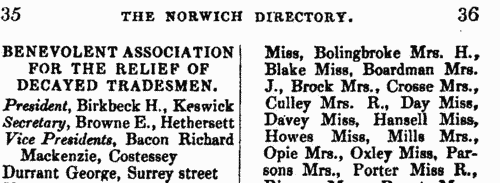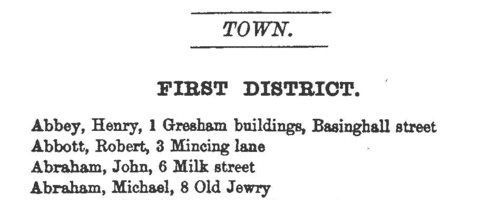Cranefield Surname Ancestry ResultsOur indexes 1000-1999 include entries for the spelling 'cranefield'. In the period you have requested, we have the following 22 records (displaying 11 to 20): Single Surname Subscription | | | Buying all 22 results of this search individually would cost £132.00. But you can have free access to all 22 records for a year, to view, to save and print, for £100. Save £32.00. More... |
These sample scans are from the original record. You will get scans of the full pages or articles where the surname you searched for has been found. Your web browser may prevent the sample windows from opening; in this case please change your browser settings to allow pop-up windows from this site. Voters in the Eastern Division of Norfolk, for the parish of Banningham, near Aylsham
(1832)
Under the Reform Act of 1832, the County of Norfolk was allotted four Members of Parliament, being two Knights of the Shire for the Eastern Division and two for the Western. The Eastern Division included the hundreds of Blofield, Clavering, Depwade, Diss, Earsham, North Erpingham, South Erpingham, Eynsford, East Flegg, West Flegg, Forehoe, Happing, Henstead, Humbleyard, Loddon, Taverham, Tunstead and Walsham. The franchise was available to freeholders worth 40s a year or over; copyholders and long leaseholders of £10 or more; short leaseholders and tenants of £50 or more: but limited to adult males. Voting took place on 20 and 21 December 1832. This poll book lists the voters for each parish, with the votes cast. Voting was not compulsory, and non-voters are not listed. Each voter had two votes: the votes are indicated in the columns C. (Lord Henry Cholmondeley, 2852); P. (Nathaniel William Peach, 2960); K. (Hon. George Keppel, 3261); and W. (William Howe Windham, 3304). The voters were not necessarily resident in the parish, but derived their franchise from the land there; so some of the names have addresses outside the parish. After the name there may appear the abbreviations cop. for copyholder; oc. for occupier; or le. for leaseholder: the rest are freeholders or annuitants.CRANEFIELD. Cost: £6.00.  | Sample scan, click to enlarge

| Voters in the Eastern Division of Norfolk, for the parish of Erpingham, near Aylsham
(1832)
Under the Reform Act of 1832, the County of Norfolk was allotted four Members of Parliament, being two Knights of the Shire for the Eastern Division and two for the Western. The Eastern Division included the hundreds of Blofield, Clavering, Depwade, Diss, Earsham, North Erpingham, South Erpingham, Eynsford, East Flegg, West Flegg, Forehoe, Happing, Henstead, Humbleyard, Loddon, Taverham, Tunstead and Walsham. The franchise was available to freeholders worth 40s a year or over; copyholders and long leaseholders of £10 or more; short leaseholders and tenants of £50 or more: but limited to adult males. Voting took place on 20 and 21 December 1832. This poll book lists the voters for each parish, with the votes cast. Voting was not compulsory, and non-voters are not listed. Each voter had two votes: the votes are indicated in the columns C. (Lord Henry Cholmondeley, 2852); P. (Nathaniel William Peach, 2960); K. (Hon. George Keppel, 3261); and W. (William Howe Windham, 3304). The voters were not necessarily resident in the parish, but derived their franchise from the land there; so some of the names have addresses outside the parish. After the name there may appear the abbreviations cop. for copyholder; oc. for occupier; or le. for leaseholder: the rest are freeholders or annuitants.CRANEFIELD. Cost: £6.00.  | Sample scan, click to enlarge

| Electors of Antingham
(1840)
The register of electors entitled to vote in any parliamentary election for East Norfolk between 1 November 1840 and 1 November 1841 lists 8,556 freeholders arranged by hundred and within hundred by parish or township &c. In the first column, after number within the register, the elector's name is given (surname first); the second column gives place of abode; the third column the nature of qualification (such as 'owner and occupier'); and the fourth column the address of the qualifying property, in some cases with the name of the tenant or occupier.CRANEFIELD. Cost: £4.00.  | Sample scan, click to enlarge

| Electors of Banningham
(1840)
The register of electors entitled to vote in any parliamentary election for East Norfolk between 1 November 1840 and 1 November 1841 lists 8,556 freeholders arranged by hundred and within hundred by parish or township &c. In the first column, after number within the register, the elector's name is given (surname first); the second column gives place of abode; the third column the nature of qualification (such as 'owner and occupier'); and the fourth column the address of the qualifying property, in some cases with the name of the tenant or occupier.CRANEFIELD. Cost: £4.00.  | Sample scan, click to enlarge

| Electors of Erpingham
(1840)
The register of electors entitled to vote in any parliamentary election for East Norfolk between 1 November 1840 and 1 November 1841 lists 8,556 freeholders arranged by hundred and within hundred by parish or township &c. In the first column, after number within the register, the elector's name is given (surname first); the second column gives place of abode; the third column the nature of qualification (such as 'owner and occupier'); and the fourth column the address of the qualifying property, in some cases with the name of the tenant or occupier.CRANEFIELD. Cost: £4.00.  | Sample scan, click to enlarge

| Tenants and occupiers of Bradfield
(1840)
The register of electors entitled to vote in any parliamentary election for East Norfolk between 1 November 1840 and 1 November 1841 lists 8,556 freeholders arranged by hundred and within hundred by parish or township &c. In the first column, after number within the register, the elector's name is given (surname first); the second column gives place of abode; the third column the nature of qualification (such as 'owner and occupier'); and the fourth column the address of the qualifying property, in some cases with the name of the tenant or occupier.CRANEFIELD. Cost: £4.00.  | Sample scan, click to enlarge

| Norwich Printers
(1842)
The Norwich Guide and Directory 'being an Historical and Topographical Description of the City and its Hamlets; with an Account of the Public Charities, and Correct Lists of the Various Professions, Trades, Public Institutions, Churches, Chapels, Municipal and other Offices; also the Names and Residences of the Nobility, Clergy, and Gentry; together with the Hours of the Arrival and Departure of the Mail and Post Coaches, Vans, Carriers, Steam and Sailing Vessels, and all Conveyances to London and the various Parts of the County of Norfolk', by G. K. Blyth, was published in 1842, and includes detailed lists of local institutions, trades and professions.CRANEFIELD. Cost: £6.00.  | Sample scan, click to enlarge

| Traders and professionals in London
(1856)
The Post Office London Directory for 1856 includes this 'Commercial and Professional Directory', recording over 100,000 individuals. CRANEFIELD. Cost: £4.00.  | Sample scan, click to enlarge

|  Persons of standing recommending London police recruits
(1843-1857) Persons of standing recommending London police recruits
(1843-1857)
The Metropolitan Police Register of Joiners (MEPO 4/334) lists policemen joining the force 1 January 1843 to 1 April 1857 (warrant numbers 19893 to 35804). The register is alphabetical, in so far as the recruits are listed chronologically grouped under first letter of surname. It gives Date of Appointment, Name, Number of Warrant, Cause of Removal from Force (resigned, dismissed, promoted or died), and Date of Removal. Although the register was closed for new entrants at the end of 1842, the details of removals were always recorded, some being twenty or more years later. Those recruits not formerly in the police, the army, or some government department, were required to provide (normally) at least two letters of recommendation from persons of standing, and details of these are entered on the facing pages. Where a recruit was only recently arrived in the metropolis, the names and addresses of the recommenders can be invaluable for tracing where he came from. Those recruits not formerly in the police, the army, or some government department, were required to provide (normally) at least two letters of recommendation from persons of standing, and details of these are entered on the facing pages: the names in these are indexed here (the police recruits are indexed separately and not included here). Recruits transferred from other forces or rejoining the force did not normally need recommendations - in the latter case, former warrant numbers are given - but some recommendations are from police inspectors, even other constables. Recruits coming from the army sometimes have general military certificates of good conduct, but most often have a letter from their former commanding officer; recruits recommended by government departments (most often the Home Office) similarly have letters from the head of department. But the great majority of the names and addresses in these pages are of respectable citizens having some sort of personal acquaintance with the recruit. Where more than two recommendations were provided, the clerk would only record one or two, with the words 'and others'. Tradesmen are sometimes identified as such by their occupations; there are some gentry. Although the bulk of these names are from London and the home counties, a scattering are from further afield throughout Britain and Ireland. CRANEFIELD. Cost: £8.00.  | Sample scan, click to enlarge

| London Members of the National Provident Institution
(1870)
The membership lists of the National Provident Institution were issued in separate volumes for Town (i. e., London and vicinity) and Country members. This list of Town Members is arranged alphabetically within fifteen districts (1 City; 2 Strand, Bloomsbury; 3 Pentonville, Islington, Highbury, Holloway; 4 Soho, St James's, Marylebone; 5 Camden Town, Kentish Town, Hampstead, Highgate; 6 Regent's Park, St John's Wood, Kilburn; 7 Paddington, Bayswater, Notting Hill, Acton, Ealing; 8 Brompton, Kensington, Hammersmith; 9 Westminster, Pimlico, Chelsea, Fulham; 10 Bishopsgate Without, Shoreditch, Finsbury, City Road, Hoxton; 11 Kingsland, De Beauvoir Town, Mildmay Park, Stoke Newington, Stamford Hill, Tottenham, Edmonton; 12 Whitechapel, Docks, Stepney, Limehouse, Poplar, Plaistow, Barking; 13 Spitalfields, Hackney Road, Bethnal Green, Mile End, Bow, Old Ford, Stratford; 14 Dalston, Hackney, Homerton, Clapton; 15 Southwark). Full name is given, surname first, and full postal address except in those few cases where the member subscribed through an agent. CRANEFIELD. Cost: £4.00.  | Sample scan, click to enlarge

|
Research your ancestry, family history, genealogy and one-name study by direct access to original records and archives indexed by surname.
|













